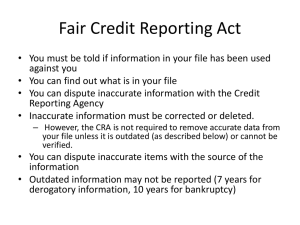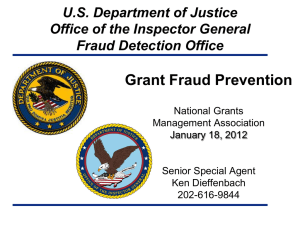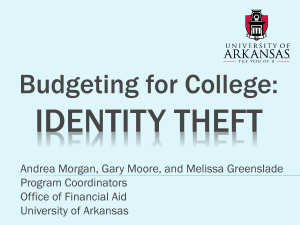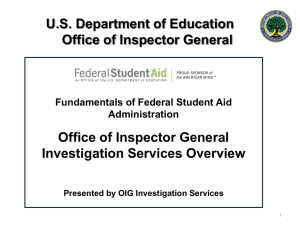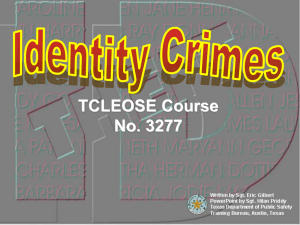may have engaged in fraud
advertisement
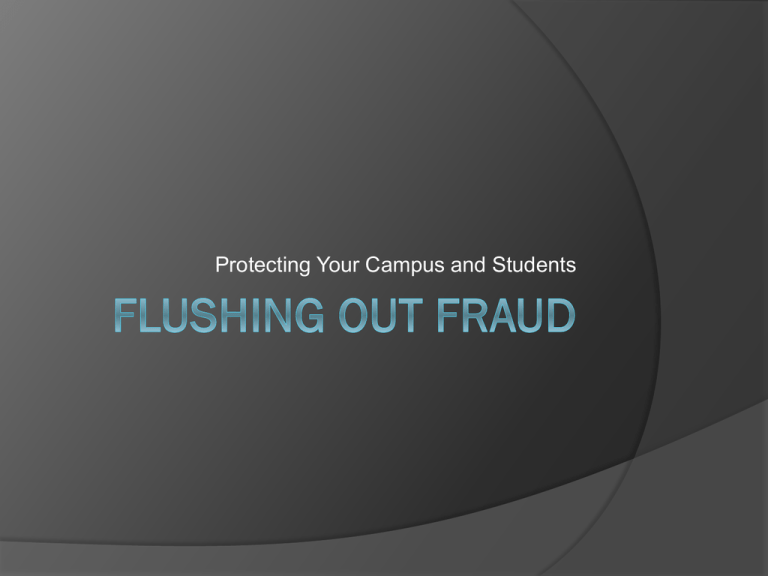
Protecting Your Campus and Students Panel Jenifer Roberts Director of Student Financial Planning New England College of Business and Finance Kim Tibbetts Associate Director of Financial Aid Wentworth Institute of Technology Dora Espitia Senior Assistant Director of Financial Aid Wentworth Institute of Technology Andy Tsui Supervisory Special Agent IRS Criminal Investigation - Boston Field Office Mark Deckett Special Agent Department of Education - Office of Inspector General Overview of the Types of Fraud Identity Tax Theft Fraud Financial Aid Check Fraud Chasers Segment 1: Identity Theft and Tax Fraud Types of Identity Theft Financial/Credit Card Insurance Medical Criminal Driver’s License Social Security Child ID Theft Segment 1: Identity Theft and Tax Fraud What is Tax Refund Identity Theft? Occurs when someone uses your personal information without your permission to commit tax fraud (Federal Income Taxes). ID Theft with Puerto Rican Identities ID Theft with Prisoner Schemes ID Theft with Retires/Elderly ID Theft with Students Violation of Title 18 U.S.C. § 1028 Why is it Important to You? 2011 – IRS Identified 2.2 Million fraudulently filed tax returns. 940,000 of them claiming $6.5 Billion involved identity theft. Who are the victims? Institutions of Higher Education ○ Internal data theft from employees/contractors ○ External data theft from hacking, email fishing, etc… Students ○ They may not find out for years if they do not file tax returns. ○ Other Id Theft crimes may have occurred (credit cards, loans, etc…) How can Students and Institutions Protect Themselves? Students Advise students to obtain tax transcripts from IRS even when they are not required to file a tax return Educate students on the problem of ID theft with tax fraud and other types of fraud Focus on protecting personal information (shred documents, don’t give out info in suspect situations, don’t download or open suspect electronic files, etc…) IRS ID Theft http://www.irs.gov/uac/Taxpayer-Guide-to-Identity-Theft FTC http://www.ftc.gov/bcp/edu/microsites/idtheft2012/ How can Students and Institutions Protect Themselves? Institutions Promote campus-wide information campaign ○ Incorporate information into student orientations ○ Provide after hours seminars on ID theft Create, disseminate and enforce a policy on protecting Personally Identifiable Information (PII) Provide a readymade packet of resources for victims of ID theft Alabama Woman Sentenced for Stealing Identities of Student Loan Borrowers and Filing False Tax Returns 12/21/ 2011 Montgomery, Ala., Janika F Bates, of Millbrook, Ala., was sentenced to 94 months in prison and ordered to pay $246,064 in restitution to HSBC Taxpayer Financial Services and $30,211 in restitution to the IRS. Bates was convicted by a trial jury in September 2011 of identity theft, wire fraud, aggravated identity theft and conspiracy to make false claims for tax refunds. According to evidence introduced at trial, Bates obtained the names and Social Security numbers of student loan borrowers from the databases at her former employer and conspired to use the stolen identifying information to file false tax returns. Several victims testified that they did not consent to the use of their names and Social Security numbers on tax returns and they testified that they did not receive any money from refunds generated from the false documents filed with the IRS. Evidence also revealed that Bates and her co-conspirator, Keshia Brayboy, fraudulently obtained refund anticipation loans from a bank predicated on the fraudulently filed tax returns. Brayboy pleaded guilty in 2009 to filing a false tax return and served two years in federal prison. South Florida Man Sentenced for Identity Theft Related Charges 09/04/2012 Fort Lauderdale, Fla. Loverson Gelmine was sentenced to 40 months in prison and three years of supervised release for possession of fifteen or more unauthorized access devices and aggravated identity theft. According to the factual proffer, Gelmine admitted that he had been involved in stealing identity information from a medical center. Gelmine admitted that he took pictures of patient files with his phone and then sold the identity information. He estimated that he sold approximately fifty identities in each of two prior transactions. A warrant for the search of Gelmine’s phone revealed approximately 1,100 photographs of patient records containing the personal identity information of patients. Former Customer Service Representative Sentenced for Stealing Customers’ Identifying Information to File False Income Tax Returns 07/23/2012 Fort Worth, Texas Youlanda Rochelle Wright was sentenced to 78 months in prison and ordered to pay $166,384 in restitution. Wright pleaded guilty in December 2011 to one count of false claims and one count of identity theft. According to court documents, Wright worked as a corporate Customer Service Representative in a call center. In that role, she often received customers’ personal identifying information, including social security numbers. Wright used that information to file U.S. income tax returns in customer’s names to claim refunds. Segment 2: Financial Aid Fraud Who may be targeted Schools with online programs Institutions driven by enrollment numbers Implications CDRs Audit Reviews Segment 2: Financial Aid Fraud Identifying patterns and quality assurance # of phone calls from the same area code close to start date Cross reference email addresses Become knowledgeable about geographic areas from where fraud is originating Utilize Google Maps to research address (i.e., homes may no longer exist due to hurricanes, tornados or other natural disasters Engage with students on the phone Segment 2: Financial Aid Fraud Implementation of interdepartmental policies to combat fraud Admissions should request proof of identity Other offices should pay attention to small details ○ Registrar’s withdrawals ○ FA verification documents ○ Bursar refunds Educate the staff how to deal with individuals who threaten to call the Department of Education Segment 3: Check Chasers What are ‘Check Chasers’ Identifying potential fraud Pulling NSLDS records on all incoming students ○ Review previous school history regarding Pell and loans ○ Do they have open loan periods or potential overlapping loan periods Do they have transfer credits from several other schools Student is hesitant to provide more information Student knows your refund policy in and out Segment 3: Check Chasers Implementation of interdepartmental policies ○ SAP policy will flush them out ○ Schools can adjust COAs Inspector General Act of 1978 …to prevent and detect fraud, waste and abuse and improve the economy, efficiency and effectiveness of Education Department programs and operations. 17 Statutory and Regulatory Access to Records Under the Inspector General Act of 1978, as amended, OIG can access any records available to the Department of Education in order to perform audits, investigations and inspections of Department programs and operations. The Family Educational Rights and Privacy Act (FERPA) requires schools receiving funding from the Department of Education to protect the privacy of student education records. In many cases consent must be received from a parent or student before records can be disclosed. FERPA provides that consent is not required in order to disclose student records to the Office of Inspector General. The regulations provide that representatives of the Secretary, which include OIG, may have access without prior consent in connection with an audit, evaluation, or enforcement of legal requirements related to the Department’s programs. FERPA regulations can be found at 34 C.F.R. Part 99, http://www2.ed.gov/policy/gen/guid/fpco/index.html 18 Criminal Penalties Education Fraud Title 20 U.S.C. § 1097 (a) Any person who knowingly and willfully embezzles, misapplies, steals, obtains by fraud, false statement, or forgery, or fails to refund any funds, assets, or property provided or insured under this subchapter and part C of subchapter I of chapter 34 of Title 42, or attempts to embezzle,…. Persons convicted of a felony shall be fined not more than $20,000 or imprisoned for not more than 5 years, or both. Attempt is defined as, “an undertaking to do an act that entails more than mere preparation but does not result in the successful completion of the act.” 19 Identity Theft Fraud Schemes Evugeni Tetioukhine aka Finnoghal Maceoghan Convicted in Rhode Island on charges of using a false social security number, student loan fraud, wire fraud, immigration fraud and false statements. Tetioukhine was a Russian national that was living in Rhode Island 1990’s. After the collapse of the Soviet Union, he fraudulently assumed the identity of Finnogal Maceoghan, a U. S. Citizen who was living in Ireland. Using the stolen identity he obtain federal student aid, a home mortgage and U.S. Passport. The victim Maceoghan discovered that his identity had been stolen while using Facebook. After a jury trial, Tetioukhine was sentenced to four years in prison and deportation. 20 Example of OIG Investigation Distance Education Fraud These fraud rings generally target institutions with low tuition in the context of distance education programs and involve a ringleader who: • Obtains identifying information from “straw” students by promising financial gain. • Completes multiple financial aid applications using the information collected. • Applies for admission under the institution's open admissions program. • Participates minimally in the amount of on-line interaction to secure disbursements. Once the institution draws down Federal student aid funds, deducts the institutional charges assessed the straw student, and disburses the credit balances to the straw student by check or debit card. Straw students then give a portion of the proceeds to the ringleaders while keeping the remaining portion. 21 Examples of Title IV Fraud Schemes Related to Schools Ghost students Leasing of eligibility Default rate fraud 90/10 Rule manipulation scheme Financial statement falsification Falsified last date of attendance Obstruction of a federal audit or program review. Fraud/Theft by School Employees FAFSA fraud- enrollment Falsification of GEDs/HS Diplomas Falsification of attendance and Satisfactory Academic Progress Falsification of grades Failure to make refunds Loan theft/ forgeries 22 23 How You Can Help Ensure that staff receive necessary Title IV training. Review documents thoroughly. Question documents/Verify authenticity. Request additional information from the students or parents. Compare information on different documents. Contact the OIG if you suspect fraud. Cooperate with the OIG in connection with an audit or investigation. 24 34 CFR § 668.16 Standards of Administrative Capability The Secretary considers an institution to have administrative capability if the institution: (f) Develops and applies an adequate system to identify and resolve discrepancies in the information that the institution receives from different sources with respect to a student’s application for financial aid under Title IV. (g) Refers to the Office of Inspector General…any credible information indicating that an applicant for Title IV, HEA program assistance may have engaged in fraud or other criminal misconduct in connection with his or her application. Schools must also refer to the OIG any third-party servicer who may have engaged in fraud, breach of fiduciary responsibility, or other illegal conduct involving the FSA Programs. Summary Join forces with other departments Educate families and students Develop, disseminate and enforce PII policies Utilize available tools NSLDS Staff Student Budgets Report any suspected fraud Regulations that Support Your Efforts to Prevent Fraud Dear Colleague Letter GEN 11-17 (October 20, 2011) Institutions are required to have processes to verify identity that are subject to review by the institution’s accreditor (34 CFR 602.17(g)) Other Resources Dear Colleague Letter GEN 12-15 (August 14, 2012) Discharge of loans which were fraudulently certified Inspector General’s Hotline 1-800-MIS-USED http://www2.ed.gov/about/offices/list/oig/hotline.html Questions?

